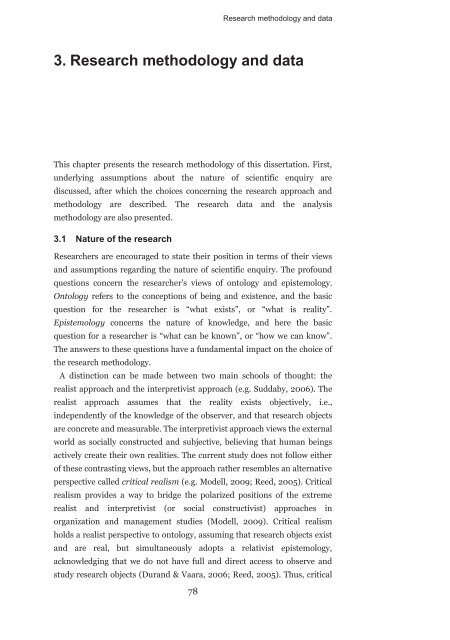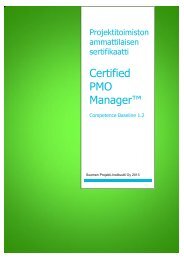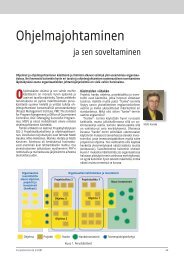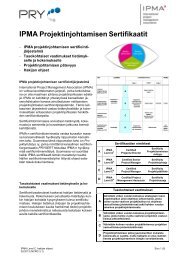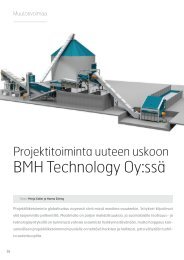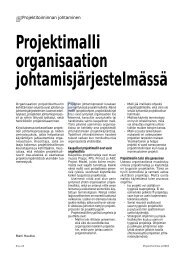Boundary activities and readiness for ... - Projekti-Instituutti
Boundary activities and readiness for ... - Projekti-Instituutti
Boundary activities and readiness for ... - Projekti-Instituutti
You also want an ePaper? Increase the reach of your titles
YUMPU automatically turns print PDFs into web optimized ePapers that Google loves.
Research methodology <strong>and</strong> data<br />
3. Research methodology <strong>and</strong> data<br />
This chapter presents the research methodology of this dissertation. First,<br />
underlying assumptions about the nature of scientific enquiry are<br />
discussed, after which the choices concerning the research approach <strong>and</strong><br />
methodology are described. The research data <strong>and</strong> the analysis<br />
methodology are also presented.<br />
3.1 Nature of the research<br />
Researchers are encouraged to state their position in terms of their views<br />
<strong>and</strong> assumptions regarding the nature of scientific enquiry. The profound<br />
questions concern the researcher’s views of ontology <strong>and</strong> epistemology.<br />
Ontology refers to the conceptions of being <strong>and</strong> existence, <strong>and</strong> the basic<br />
question <strong>for</strong> the researcher is “what exists”, or “what is reality”.<br />
Epistemology concerns the nature of knowledge, <strong>and</strong> here the basic<br />
question <strong>for</strong> a researcher is “what can be known”, or “how we can know”.<br />
The answers to these questions have a fundamental impact on the choice of<br />
the research methodology.<br />
A distinction can be made between two main schools of thought: the<br />
realist approach <strong>and</strong> the interpretivist approach (e.g. Suddaby, 2006). The<br />
realist approach assumes that the reality exists objectively, i.e.,<br />
independently of the knowledge of the observer, <strong>and</strong> that research objects<br />
are concrete <strong>and</strong> measurable. The interpretivist approach views the external<br />
world as socially constructed <strong>and</strong> subjective, believing that human beings<br />
actively create their own realities. The current study does not follow either<br />
of these contrasting views, but the approach rather resembles an alternative<br />
perspective called critical realism (e.g. Modell, 2009; Reed, 2005). Critical<br />
realism provides a way to bridge the polarized positions of the extreme<br />
realist <strong>and</strong> interpretivist (or social constructivist) approaches in<br />
organization <strong>and</strong> management studies (Modell, 2009). Critical realism<br />
holds a realist perspective to ontology, assuming that research objects exist<br />
<strong>and</strong> are real, but simultaneously adopts a relativist epistemology,<br />
acknowledging that we do not have full <strong>and</strong> direct access to observe <strong>and</strong><br />
study research objects (Dur<strong>and</strong> & Vaara, 2006; Reed, 2005). Thus, critical<br />
78


